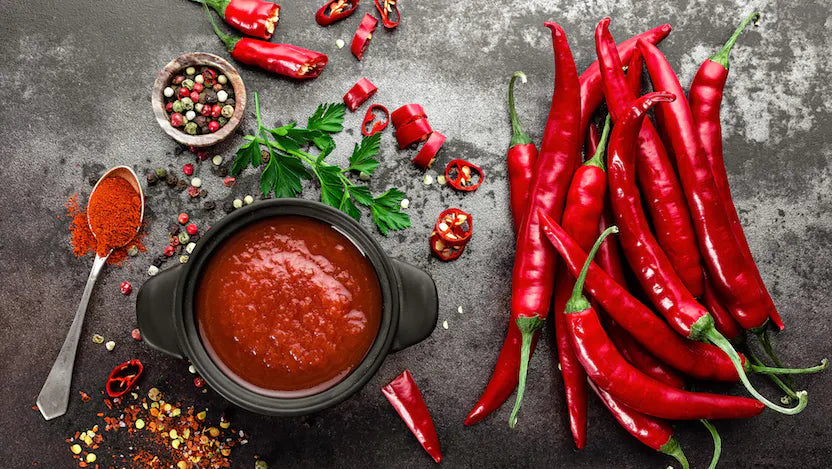Hemorrhoids are a common yet often uncomfortable condition affecting many people worldwide. They can cause pain, itching, and bleeding, impacting daily life and comfort. One question that frequently arises is whether spicy food can trigger hemorrhoids or exacerbate their symptoms. This blog post will explore the relationship between spicy food and hemorrhoids, examining the causes, symptoms, and ways to manage this condition effectively.
Understanding Hemorrhoids
Hemorrhoids, also known as piles, are swollen veins in the lower rectum and anus. They can be internal or external, and their severity can range from mild discomfort to significant pain and bleeding. Hemorrhoids are caused by increased pressure in the lower rectum, which can be due to various factors such as:
- Straining during bowel movements
- Chronic constipation or diarrhea
- Pregnancy
- Obesity
- Prolonged sitting or standing
- Heavy lifting
Common Symptoms of Hemorrhoids
The symptoms of hemorrhoids can vary depending on their location and severity. Common symptoms include:
- Pain or discomfort in the anal area
- Itching or irritation
- Swelling around the anus
- Bleeding during bowel movements
- A lump near the anus, which may be sensitive or painful
Can Spicy Food Trigger Hemorrhoids?
The belief that spicy food can trigger hemorrhoids or worsen their symptoms is widespread. However, the relationship between spicy food and hemorrhoids is not straightforward. Spicy foods do not directly cause hemorrhoids, but they can exacerbate symptoms in individuals who already have this condition. Here's how:
Irritation of the Digestive Tract
Spicy foods contain compounds such as capsaicin, which can irritate the lining of the digestive tract. This irritation can lead to increased bowel movements and diarrhea, which may cause or worsen hemorrhoids by increasing pressure and straining during bowel movements.
Increased Sensitivity
Individuals with hemorrhoids may find that spicy foods increase the sensitivity of their digestive system, leading to more pronounced symptoms such as burning sensations and discomfort during bowel movements. This heightened sensitivity can make existing hemorrhoids more painful and challenging to manage.
Other Factors Contributing to Hemorrhoids
While spicy foods can worsen hemorrhoid symptoms, other dietary and lifestyle factors play a more significant role in the development and management of this condition. These factors include:
Low-Fiber Diet
A diet low in fiber can lead to constipation, one of the primary causes of hemorrhoids. Fiber adds bulk to the stool, making it easier to pass and reducing the need for straining during bowel movements. Increasing your intake of fruits, vegetables, whole grains, and legumes can help prevent and manage hemorrhoids.
Dehydration
Inadequate fluid intake can lead to hard, dry stools, which can cause straining during bowel movements. Staying hydrated by drinking plenty of water is essential for maintaining regular bowel movements and preventing hemorrhoids.
Sedentary Lifestyle
Prolonged sitting or standing can increase pressure on the rectal veins, contributing to the development of hemorrhoids. Regular physical activity can help improve circulation and reduce the risk of hemorrhoids.
Managing Hemorrhoids
Effective management of hemorrhoids involves addressing the underlying causes and adopting lifestyle changes to prevent flare-ups. Here are some practical tips:
Dietary Changes
- Increase Fiber Intake: Incorporate high-fiber foods into your diet to promote regular bowel movements. Examples include fruits, vegetables, whole grains, and legumes.
- Stay Hydrated: Drink plenty of water throughout the day to keep stools soft and prevent constipation.
- Limit Spicy Foods: If you find that spicy foods exacerbate your hemorrhoid symptoms, consider reducing your intake or avoiding them altogether.
Lifestyle Adjustments
- Exercise Regularly: Engage in regular physical activity to improve circulation and reduce the risk of constipation.
- Avoid Prolonged Sitting or Standing: Take breaks and move around if you sit or stand for long periods.
- Practice Good Bathroom Habits: Avoid straining during bowel movements and do not delay going to the bathroom when you feel the urge.
Home Remedies
- Warm Sitz Baths: Soak the affected area in warm water for 15-20 minutes several times a day to reduce swelling and discomfort.
- Over-the-Counter Creams and Ointments: Use topical treatments designed for hemorrhoids to alleviate pain, itching, and inflammation.
- Cold Compresses: Apply cold packs to the affected area to reduce swelling and numb the pain.
When to Seek Medical Attention
While home remedies and lifestyle changes can effectively manage mild hemorrhoid symptoms, it's essential to seek medical attention if:
- Symptoms persist or worsen despite self-care measures
- You experience severe pain or discomfort
- You notice significant bleeding during bowel movements
- A lump near your anus becomes more painful or changes in size
A healthcare provider can offer more advanced treatment options, such as prescription medications, minimally invasive procedures, or surgery, if necessary.
Summary
While spicy food does not directly cause hemorrhoids, it can exacerbate symptoms in individuals who already have this condition. The primary factors contributing to hemorrhoids include a low-fiber diet, dehydration, and a sedentary lifestyle. By making dietary and lifestyle changes, such as increasing fiber intake, staying hydrated, and exercising regularly, you can effectively manage and prevent hemorrhoid flare-ups. If your symptoms persist or worsen, seek medical attention to explore advanced treatment options.

